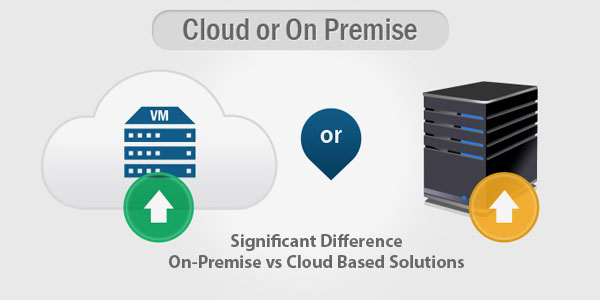Significant Difference – On-Premise vs Cloud Based ERP Solutions
Today while moving the business towards updated technology, the question of on-premises and cloud based solutions repeatedly comes up. Which type of technology is actually work for business on long terms? Adoption and implementation of Cloud Based ERP are undoubtedly beneficent in increasing the business advantages. It facilitates the organization with off-premises data storage and could be easily scaled up and down accordingly.
Besides all other benefits of cloud based solution, there are some organizations that prefer on-premise software solutions. On-premise and cloud-based solutions have their own unique values and advantages that couldn’t be ignored.
Both have their own advantages and drawbacks, therefore, it requires deep concentration to make the right selection.
On-Premise vs Cloud Based Solutions
Significant differences of on and off-premise are discussed below in detail that drives towards and efficient solution.
Collaboration
One of the key advantages of cloud-based solutions is that enhance the collaboration among organization and different departments. Implementation of Cloud ERP solutions have made it easier for management and co-workers to interact. The greatest advantage of cloud technology could be observed and experienced easily by seeing the improvements in productivity. Most of the organizations prefer cloud based ERP for their infrastructure and get environmental benefits and others.
Electricity and Other Costs
On-premises software solutions include the expenses of electricity because it requires it to take power. Server rooms eat up and amount of electricity that is quite expensive. Along with electricity other server maintenance charges etc. are also included in it. While cloud technology has eliminated such costs for small and large businesses and make it more affordable.
Where Actually Solutions Accommodated?
The primary difference between on-premises and the off-premises software application is their physical availability. On-premises software, applications are stored in servers, physically placed within the organization. On the other hand, cloud based solutions implementation didn’t require any specific IT infrastructure from the organization. They are physically located in some other data center. System maintenance, update, temperature and other essentials will be delivered by the data centers.
Bandwidth
Usually, businesses don’t find enough bandwidth to support their applications. This bandwidth isn’t enough for a deployed application to transfer data. The approach towards the solution in the cloud is to enhance your investment and increase cloud size as well as capacity. Here the organizations based on on-premises solutions consider it a time to update their systems. It is quite easier to add some virtual or physical server and increase its bandwidth that usually received from the ISPs. This on-premises solution requires additional operational costs.
Cloud based software solutions are offering detail guidelines and a completely virtual environment that could be easily deployed. It becomes quite simple for the IT managers of an organization to implement and manage an off-premises software. It is an excellent approach towards easy installation, configuration and updates the cloud based ERP Software solution. While on-premises software requires manual installation and configuration.
If an organization has planned to move on with the latest technology, it is essential to observe and understand your organizational requirements. Review different pros and cons of cloud based ERP software and off-premises and take right decision with enhanced understandings.

Comments
Post a Comment